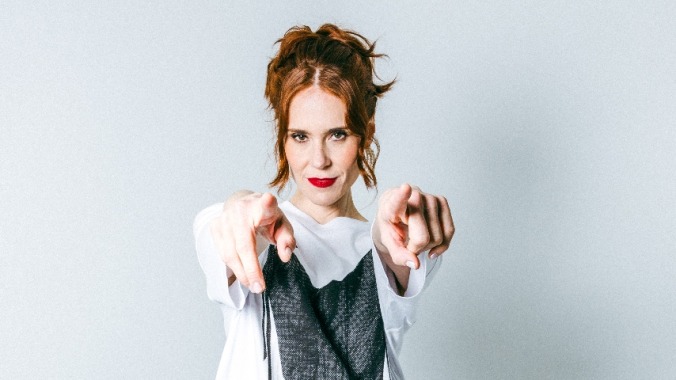As Musicians Hit Financial Rock Bottom, Kate Nash Shows Hers
From Caroline Polachek to Little Simz, artists have railed against the rising costs of touring since the pandemic. English singer-songwriter Kate Nash started an OnlyFans in order to produce a safe, high quality tour, while also shining a light on the industry's failure to support musicians.
Photo by Alice Baxley
There’s a line on the opening track of Kate Nash’s new album 9 Sad Symphonies—released in June of this year on the legendary label Kill Rock Stars—that keeps buzzing in my brain: “I guess what I’m asking is, am I a number or am I a person?” It’s a thought that haunts me regularly in our capitalism-ravaged world; to the powers-that-be, we are merely a means to an end, our only worth found in our consumption or our provision of labor in a system irrevocably stacked against us.
For musicians, this is an especially dire situation, as they’re expected to put out works of art that have taken years to create, all so that we can listen to them for free-or-cheap on vampiric corporate streaming platforms. And then they’re supposed to go on tour, which is a prohibitively expensive endeavor, especially since the pandemic. Touring costs have skyrocketed by about 40% since lockdowns, as USC music business professor and Warped Tour founder Kevin Lyman told KCRW earlier this year. For anyone who’s not a megastar like Taylor Swift, going on tour often results in losses. Caroline Polachek, Little Simz, English Teacher and Animal Collective are just some of the artists that have spoken out in recent years about the financial perils of touring.
Nash wasn’t having any of it. The English singer-songwriter is currently playing in the UK and Europe to celebrate 9 Sad Symphonies, but in light of the astronomical costs required for a high quality show (in terms of production value, safety and proper crew compensation), she announced last week that she’s starting an OnlyFans account, dubbing the move “Butts 4 Tour Buses.” (And she’s hardly the only notable artist on the platform—Lily Allen is selling feet pics on OnlyFans.)
“Honestly, I was really stressed about the finances of the tour. It genuinely was making me freak out because there’s just so many losses on tours, and it is a real financial strain,” Nash tells me over the phone ahead of her Leeds show. She’s no stranger to grassroots campaigns, having done Kickstarters in the past, and is already benefitting from her decision to start an OnlyFans. Nash explains: “It’s an amazing feeling. I feel really empowered. I’ve been able to hire a member of crew that I wasn’t able to bring to Europe, which is changing someone’s life and making my show better, and means I’m able to carry on touring a high quality show ethically. I’m just kind of like, where can my arse take me next? What can I reinvest back into? How much art am I going to be able to make with my bum?”
Of course, upon hearing that a woman was taking agency over her body, some critics crawled out of the woodwork, from your dime-a-dozen prudes to SWERFs (sex worker exclusive radical feminists—for the record, Nash clarified in an Instagram post that she’s “not sure” if what she’s doing counts as sex work, though she supports people in that industry). But Nash was also met with an outpouring of love from all sorts of people who understand what she’s doing.
“I am actually shining a light on a really important fucking issue that I care about, about my industry failing every single musician within it. But it’s also hilarious because it’s my bum so, no matter what way you look at it, it always comes back to humor, and I love that. And so I love getting texts being like, ‘I’m so proud of you.’ And I love that everyone’s so proud of my bum,” she says with a laugh.
It’s classic Nash; she’s always had a razor-sharp sense of humor, which many of us first enjoyed in 2007 with her biting single “Foundations.” In the years since her indie-twee hit record Made of Bricks, she’s released four albums (including my personal favorite, the angular, ambitious 2013 LP Girl Talk), starred in the Netflix series GLOW (another chance for her to show off her comedic chops) and been an outspoken advocate for women and queer people.
-

-

-

-

-

-

-

-

-

-

-

-

-

-

-

-

-

-

-

-

-

-

-

-

-

-

-

-

-

-

-

-

-

-

-

-

-

-

-

-








































